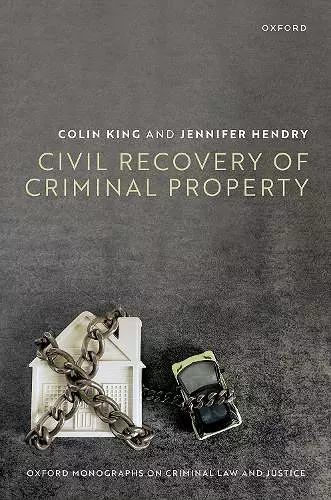Civil Recovery of Criminal Property
Prof Colin King author Prof Jennifer Hendry author
Format:Hardback
Publisher:Oxford University Press
Published:17th Aug '23
Currently unavailable, and unfortunately no date known when it will be back

Follow-the-money' approaches are increasingly being adopted to tackle organized crime, corruption, and terrorist activities. The rationale behind such an approach is oft stated: to show that crime does not pay, to reinforce confidence in a fair and effective criminal justice system, and to deter criminal activity. Civil Recovery of Criminal Property is an in-depth analysis of the confiscation of the proceeds of crime in the absence of criminal conviction in Ireland and England & Wales, more than two decades since the introduction of this civil/criminal hybrid procedure. This book considers the development of civil recovery in both jurisdictions, providing a comprehensive comparative account and critical examination of its legislative context and framework, judicial reception, and case law development. It leads the argument that civil recovery—like other civil/criminal hybrids—straddles civil and criminal procedure in a manner that takes advantage of the resultant legal ambiguity, to the detriment of due process, civil liberties, and human rights. Through interviews with practitioners professionally engaged with civil recovery proceedings, both in defence and in enforcement, King and Hendry remedy what has until now been a lack of empirical engagement with the operation of civil recovery in practice. The authors provide a comprehensive analysis of civil recovery in terms of its procedural hybridity, its 'follow-the-money' approach, its questionable compliance with the requirements of due process, its property-specific character, and its supposed pragmatism in tackling the problem of serious and organized crime. Blending doctrinal, socio-legal, and theoretical perspectives, Civil Recovery of Criminal Property will appeal both to academics and practitioners engaged with civil recovery.
This monograph by King and Hendry will rapidly become the standard work on civil recovery of criminal proceeds in the UK. The book gives an excellent and detailed analysis of the use of civil process against the proceeds of crime. The criminal/civil law hybridity is problematized by the authors since it allows for the circumvention of fundamental rights and criminal justice safeguards. It is a compelling read not just for those interested in civil recovery but for anyone interested in criminal justice and procedural fairness. * Professor Elies van Sliedregt, Tilburg University *
This book is an exquisite piece of work. It couples empirical research with theory and doctrine and casts a brilliant light on the use of civil process against the proceeds of crime. It is book-ended by highly informed analysis. The first pages disclose an awareness of the terminological, and substantive confusion that infuses proceeds of crime law that is rarely demonstrated elsewhere. The middle text weaves a hefty knowledge of civil processes, rights, and criminal law onto a vexing and very popular tool. It synthesizes and dissects a vast body of law - from scholarship to court decisions to the actual functioning of civil recovery processes in their real encounters. It will be of value to the Irish, England and Welsh, and European policy makers, practitioners and wider communities, but is also instrumental in understanding the fusion of civil process and crime in any jurisdiction. The content offered herein warrants wide dissemination. * Professor Michelle Gallant, University of Manitoba *
...an excellent work of critical scholarship. The authors' clear-eyed privileging of the importance of the individual's rights over justifications around pragmatism is likely to provoke mixed responses amongst academic and practitioners alike, and to reignite the debates around hybrid civil/criminal processes and the civil liberties of those who are subject to them. King's and Hendry's careful and comprehensive theorisation and discussion of the mechanism lays bare the complexities and compromises implicit in crime control in the twenty-first century. This book is essential reading for anyone interested in the conflict between principle and pragmatism in criminal justice. * Áine Clancy, The Modern Law *
ISBN: 9780198824251
Dimensions: 240mm x 162mm x 20mm
Weight: 522g
240 pages